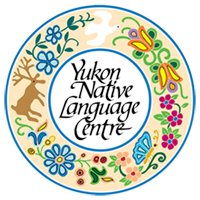Back to Kaska Learning Resources page.
Kaska is spoken in the southeastern Yukon in the communities of Ross River, Watson Lake and Upper Liard, and in northern British Columbia in the communities of Lower Post, Fireside, Good Hope Lake, Dease Lake and Muncho Lake. The Kaska language is closely related to Tagish, Tahltan and Sekani. There are some differences in the dialects of Kaska spoken in different regions. Fluent speakers can understand adjoining dialects but younger speakers often have more difficulty understanding more distant dialects. Although Tahltan, Tagish and Sekani are often identified as separate languages there is a high degree of mutual intelligibility between these languages and the adjoining dialects of Kaska.
The name Kaska is apparently derived from Kāskā, the native name of the Creek which joins the Dease River by the former settlement of McDames, British Columbia. The exact meaning of this place name is unclear. This name may have originally been applied to the people trading at McDames Post, and only later came to be identified with all the people who speak the Kaska language.
Historically Kaska traded and intermarried with both Tlingit and Tahltan trading partners. The ancestors of contemporary Kaska were already using guns and steel tools supplied by Tlingit traders when Robert Campbell and other white traders arrived. The names for some trade items, such as ūnē ‘gun’ are loan words from Tlingit into Kaska. In the later fur trade period the Kaska, especially in the Liard drainage, also interacted extensively with Slavey people of the lower Liard and Nelson Rivers. Cultural exchanges between Ross River and the Mountain Slavey of Fort Norman and Fort Franklin have renewed traditional ties between those communities as well.
The Kaska have two matrilineal moieties, called Crow and Wolf in English, which are often referred to as clans. Most Kaska are aware of their clan affiliation, but rules governing marriage and other forms of interaction between clans are less strictly observed than in the past.
The settlement of Kaska in large permanent communities is a recent phenomena. Most Kaska lived in small family camps until World War II when the Alaska highway was constructed and opportunities for wage labour rapidly increased. Many Kaska now work in resource related industries such as mining and lumbering. The Kaska have not completed an agreement with the Federal and Territorial governments regarding their traditional lands. They have sought to work with companies planning resource developments to reduce environmental damage and maximize economic benefits for Kaska people.
School Programs
There are Kaska school programs at Johnson Elementary School in Watson Lake, at the Watson Lake High School, and at the Ross River School in Ross River. There are also language programs in the schools in B.C. at Lower Post and Good Hope Lake.
Language Materials
Kaska are actively involved in efforts to maintain their language. In 1997 the Kaska Tribal Council published a two volume topical noun dictionary: Guzagi K’uge’ (ISBN 0-9682022-0-9). The linguist primarily responsible for this work was Pat Moore. The Yukon Native Language Centre conducts annual Literacy Workshops in conjunction with the Kaska and produces teaching and learning materials. These include Language Lesson Booklets and Tapes, multimedia Computer Books and corresponding Print Story Books, and reports on the Literacy Workshops.
The image below is from the computer story book, Teaching the Kids at Simpson Creek, by Barbara Morris.

